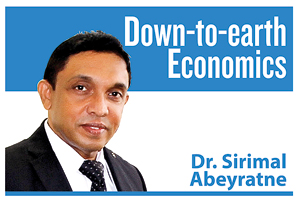Digging holes and filling them up
View(s):
File picture of a state infrastructure project.
During the time of the Great Depression in the 1930s, as businesses began to plummet, people lost jobs and incomes. Because people lost jobs and incomes, their purchases plummeted too. Because people cut back purchases, in turn businesses plummeted and closed down. And the vicious cycle of an economic crisis – the Great Depression, continued for more than a decade starting from 1929.
John Maynard Keynes of the University of Cambridge was walking along the King’s Lane near the King’s College where he was affiliated to. He seemed to be troubled with something; perhaps, it was about his big losses in the stock market, as he used to be an investor in the stock market; if not, he must have been engrossed with his new economic thoughts about the policies that require to get out of the Depression, because he was an economist.
At that time, it is not incorrect to say that, there was no “fiscal policy”, although the governments used to tax people and spend that money. There was money, but not “monetary policy”.
While walking, Keynes saw two men working down King’s Lane: One of them was digging the holes by the road-side, while the other one was going after him and filling up the holes. Apparently, it must have been something to laugh about by anyone else who saw the funny side of what was being done. But it wasn’t so for Keynes who observed it carefully.
It appeared to be an interesting thing to watch for Keynes too, but he didn’t say anything. Then, he became overwhelmed with deep thought about economics of “digging holes and filling them up” which looked absurd to anyone else.
Anything missing?
Before we turn to the crux of the matter, there is an important question to ask: Did Keynes miss anything here? In fact, to my understanding, he did. Someone else who came after Keynes, didn’t go away as he did. This second pedestrian got surprised after observing the scene, then laughed and, asked the two men if there was any meaning of the thing they were doing: “digging holes and, then filling them up.”
One man who was filling the holes answered, but he didn’t seem to have got the question right: “We are working! And, we are paid for that. What do you mean?”
The pedestrian clarified: “Yes, that’s exactly what I mean – one of you is digging holes, and the other one is filling them up. What does it mean?”
The man understood the question this time: “Oh… you mean that? Actually, there should be another man here to plant the trees in the holes, before I close them. But today he is absent.”
The pedestrian thought for a while, and then responded: “I see; you all must be government employees!” The man nodded his head to confirm that.
Wars are “gold-mines”
When people are without work, “the government should hire them and pay to dig holes in the ground, and then to fill them up again”. Today, economic students know the underlying economic principle of this statement.
They also know that this is a “Keynesian” idea which is connected to the book “The General Theory” published in 1936 – right in the middle of Great Depression. The book was written by Keynes who actually saw the devastating impact of the Great Depression with his own eyes.
However, most of the economics students are not sure if Keynes actually said it.
For sure, he didn’t say it with the same words, but he did say it. He said it in a much more vigorous way how even ‘wasteful’ loan expenditure would enrich a community. He termed digging holes in the ground as “gold-mining”. He commented that it looks wasteful, when judged on business principles. But it is the most acceptable among all solutions during an economic downturn. According to Keynes, even things like pyramid-building, earthquakes, and even wars may serve to increase wealth in a way.
Wait a minute; there is an important question: Is that the reason why some nations are keen in initiating and financing wars not in their home country, but in different parts of the world? Is it for the purpose of keeping their economies running? There is no doubt that the question is important, but it is a question which requires an answer beyond our scope.
Borrowing and wasting
I must now explain the theory of “digging holes and filling them up” in simple language: Its economic meaning is that when the private sector is weak, the government should spend so that the economic progress can be maintained.
The private sector which consists of both consumers and businessmen should spend for what is produced. Then people will have both work and income so that they are capable of spending. Producers should respond by increasing production to accommodate private spending.
During a period of economic downturn, growth slows down so that consumers and businessmen are weak in spending. Then the producers have to give up production so that it would accelerate economic downturn.
It is the time when the government should be stronger in spending, even if such expenditure looks like a “waste” when judged on business principles. Then people will have work and get an income so that they continue to spend, and production can be sustained.
There is, however, a problem: The government should also have money to spend! During the time of economic downturn the government’s tax revenue falls too. But according to the Keynesian policy advocacy, the government can either borrow money or print money, and spend! That is why, Keynes wrote about how even ‘wasteful’ loan expenditure would enrich a community.
World, upside down
It’s a famous slogan: “We are all Keynesians now.” Economic downturns are typically followed by increased government spending; and spending by borrowing and money printing so that governments become Keynesian. That’s what the world has been doing even during the past 10 years after the global financial crisis originated in the US in 2008.
 I am sure many of us can recall the policy advices that we received from the West: “Cut down government spending, because otherwise the economy will be unstable.” “Don’t print money, the inflation will rise.” “Don’t run excessive budget deficits, you will have to borrow”. But today, these are the very same advices that have been reversed in the Western world!
I am sure many of us can recall the policy advices that we received from the West: “Cut down government spending, because otherwise the economy will be unstable.” “Don’t print money, the inflation will rise.” “Don’t run excessive budget deficits, you will have to borrow”. But today, these are the very same advices that have been reversed in the Western world!
The US, Japan and many other Western European countries experienced their budget deficits growing closer to 10 per cent of GDP, and government debt over 100 per cent of GDP. Some countries in the European Union have carried out these policies too far until they plunged into greater troubles.
By the way, sometime ago high budget deficits and debt burdens were thought to be the features of underdevelopment in poor countries. Therefore, they received tough advices to discipline themselves. But in the recent past, the world has turned upside down. Advanced countries began to suffer from these troubles more than the developing countries. Isn’t it funny?
Reckless spending
Even if there is some truth in what Keynes said, I don’t think he would approve any country going too far in a “reckless marathon” in borrowing and spending. The end is absolutely painful. Somebody must be mad to think that “borrowing or printing more money will add up to prosperity”. If it has brought down even some rich nations to their knees, what do we have to say about developing countries?
Therefore, you can’t be a Keynesian forever! The government can be stronger when the private sector is weaker. However, this cannot be the absolute truth that works all the time and everywhere.
The time will come when government spending is overtaken by productive investment and productivity growth. And the cycle of changing policies will continue, as an inherent nature of the world of economics.
(The writer is a Professor of Economics at the University of Colombo and can be reached at
sirimal@econ.cmb.ac.lk).


